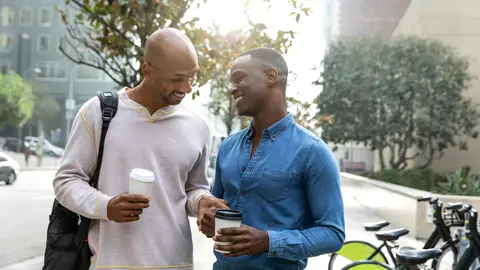OPINION: Today Is The Day To Be More Open About HIV

I will never forget the moment I first learned about HIV. It was November 7, 1991, and I was 10 years old. Before then, I don’t remember thinking about sexually transmitted infections, and I certainly hadn’t heard a Black man talk about living with one. I stood in my bedroom—half hanging off my bunk bed, likely with a Lakers basketball in hand—listening to Magic Johnson talk about testing positive for HIV.
That was nearly 20 years ago. In the time since, I cannot recall a single moment where another highly visible Black man occupied the same space. It’s as if the only Black, male celebrity living with HIV is still just Magic Johnson. But based on the fact that the virus continues to disproportionately impact Black people—we know this is not true.
In spite of the mathematical possibilities, the Black community has not yet done the work to celebrate those of us thriving with HIV, to remove the stigma associated with the virus in ways that would encourage routine testing or maintaining sexual wellness, or to name that despite the fact that HIV is no longer the death sentence it once was, it’s our community that continues suffering most. It’s time for us to change.
RELATED: How Black People Can Protect and Defend Dwyane Wade, Gabrielle Union and Zaya Wade At All Costs
Right now, it feels strange to talk about anything that’s not anchored in the crises caused by COVID-19 or police violence. However, these racialized issues are the very reasons why it’s important to continue encouraging every member of our beautifully diverse community to do more in recognition of National Gay Men’s HIV/AIDS Awareness Day. While focused on gay and same gender loving men, this anniversary is an opportunity for all Black people to start talking honestly about HIV.
The truth is, many Black people are dying not from the disease itself, but from the stigma that forces too many of us to suffer silently.
Public examples of normalizing otherwise private actions can be life changing. I was reminded of this recently while in conversation with a young man who shared how isolated he’s felt since learning he’s HIV positive. He hasn’t shared the news with many of his friends or family, for fear of judgement. “I’m already on thin ice with the gay stuff,” he said. Stories like these are why I openly share my daily use of PrEP, a pill that reduces the chances of becoming HIV positive, to help normalize the actions we can take towards holistic health.
Many of my friends have died because they felt ashamed of their HIV status, which sometimes meant they didn’t prioritize their physical or mental health. I pray moving forward, each of us will do everything we can to build a world where we can approach conversations around HIV without perpetuating harmful stigma and misinformation.
Those of us who love Black people can use today as an opportunity to begin normalizing conversations about HIV and create real opportunities to show up for one another in love. Anyone seeking ways to get engaged can: 1) get tested regularly to always know your HIV status; 2) ensure your loved ones feel supported in knowing their HIV status; 3) commit to learning about and adopting strategies to show up for Black people thriving with HIV; and 4) speak openly about managing health around HIV— whether that means sharing the steps you take to prevent contraction of the virus, or for those living with HIV, the steps you take to prioritize your health.
There is much more work to be done, and many ways we can all be meaningfully engaged. The most important thing is that you do something… starting today.
David J. Johns is the Executive Director of the National Black Justice Coalition, which works to end racism and homophobia so that all Black people can get free. He is an educator, researcher, federal policy expert, and advocate.





